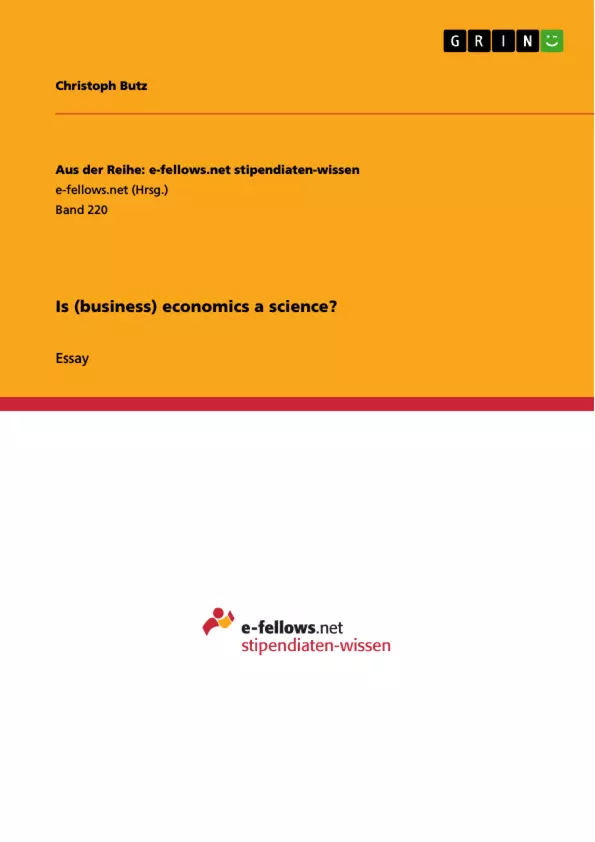One of many economic theories claims, that any kind of government intervention in competitive
markets prevents the market from reaching its equilibrium and thus causes a smaller economic
surplus and an inefficient market (McDowell et al., 2006). But is it really true? Do
politicians consider this assumption when making decisions? Actually, they often do not. The
point is, that nobody really knows the “truth” about economic theories, because economists
often disagree in their theories and predict different outcomes, as Klamer (2008) describes.
This fact leads many people to claim that (business) economics is not a real science. This paper
will debate this statement and find an answer to the problem if economics is a science or
not.
Inhaltsverzeichnis (Table of Contents)
- Exordium
- Definition of science
- Modern and hard-nosed view of the science of economics
- Postmodern view of the science of economics
- Peroratio
Zielsetzung und Themenschwerpunkte (Objectives and Key Themes)
This paper aims to address the question of whether (business) economics can be considered a science. It examines the debate surrounding the nature of science and analyzes two distinct perspectives: the modern, hard-nosed view and the postmodern perspective. The paper then applies these perspectives to the field of economics.
- Definition and characteristics of science
- Empirical verification and scientific truth
- The role of disagreement and conflicting theories in economics
- The postmodern view of scientific knowledge as a social construction
- The importance of meaningful and interesting contributions to the field of economics
Zusammenfassung der Kapitel (Chapter Summaries)
The paper begins by introducing a common economic theory about government intervention in competitive markets and the subsequent debate over whether economics is a true science. The author then defines science by exploring a common approach that involves observation, hypothesis formation, prediction, and empirical testing. The paper subsequently delves into the modern, hard-nosed view of science, highlighting the requirement for empirical verification and consistent predictions. It argues that economics falls short of this standard due to disagreements among economists, the lack of definitive proof for economic theories, and the possibility of proven theories being overturned by new observations.
The author then introduces the postmodern perspective on science, which views scientific truth as a social construction and emphasizes the importance of meaningful contributions within a community of scholars. This view is contrasted with the hard-nosed perspective and highlighted as a more suitable framework for understanding the nature of economics.
In the final chapter, the author concludes that the postmodern view of economics as a conversation aligns more closely with the realities of the field, considering the inherent disagreements and conflicting theories. The paper argues against defining economics solely based on empirical proof and proposes a more nuanced understanding of the discipline.
Schlüsselwörter (Keywords)
This paper focuses on the nature of science, particularly in the context of (business) economics. It examines the perspectives of modern and postmodern science, exploring themes such as empirical verification, scientific truth, conflicting theories, and the social construction of knowledge. The author also highlights the importance of meaningful contributions and the role of ongoing conversations within the field of economics.
Frequently Asked Questions
Is (business) economics considered a real science?
The paper debates this by contrasting the "hard-nosed" modern view, which requires empirical proof, with the postmodern view, which sees economics as a social construction and ongoing conversation.
What is the modern view of economic science?
The modern view defines science through observation, hypothesis formation, and empirical testing to find "truth." Under this view, economics often struggles due to conflicting theories.
How does the postmodern perspective view economics?
The postmodern perspective views scientific knowledge as a social construction within a community of scholars, where "truth" is less about definitive proof and more about meaningful contributions.
Why do economists often disagree on theories?
Disagreement arises because economic outcomes are difficult to predict with absolute certainty, and different theories can be supported by varying observations or social contexts.
Does government intervention always lead to inefficient markets?
While some economic theories claim intervention prevents market equilibrium, the paper suggests that these theories are debated and not universally accepted as the absolute "truth."
- Citar trabajo
- Christoph Butz (Autor), 2008, Is (business) economics a science?, Múnich, GRIN Verlag, https://www.grin.com/document/178104



